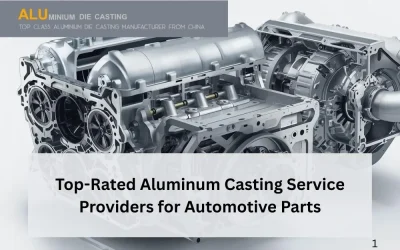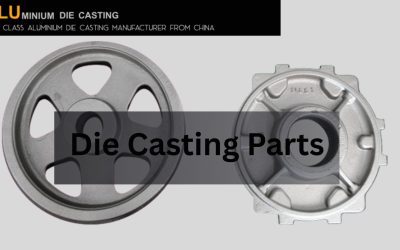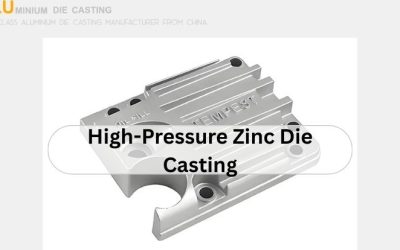Unveiling the Excellence of ALSi7Mg Die Casting: A Comprehensive Guide
Within the ever-changing realm of production, ALSi7Mg die casting has emerged as a significant player, bringing about a change in the manner in which delicate components are fashioned together. This article goes into the intricacies of ALSi7Mg alloy, examining its composition, the applications it has in die casting, and the vital function it plays in the industry.
ALSi7Mg ingredients
ALSi7Mg composition has listed as below:
- Aluminum (Al): is what makes up most of the alloy; the number usually falls between 87 and 91 percent. Part of the alloy’s light weight and resistance to rust comes from the aluminum that forms its base.
- Silicon (Si): This part makes up between 6.5% and 7.5% of the metal. Adding silicon to a metal makes it stronger, makes it less likely to wear down, and makes it easier to pour. Silicon also makes things less likely to wear out.
- Magnesium (Mg): Most of the time, it goes somewhere between 0.3% and 0.6%. Furthermore, magnesium not only makes the metal easier to cast, but it also makes it stronger and harder overall.
- Iron (Fe): Not very much of it, usually less than 0.55% of the whole. Along with that, iron could be an impurity in the raw materials or it could be put on purpose to make the alloy have certain properties.
- Copper (Cu): In the surroundings, there is a small amount, usually less than 0.1%. Copper is sometimes found as an impurity, but it can also be added to metals to make them better in some ways, like making them more resistant to corrosion.
- Manganese (Mn): Trace amounts, which are less than 0.5%, are what you’ll usually find. To deoxidize the substance, manganese may be added, or it may already be in the substance but not be a part of it.
These figures are simply preliminary estimates. They may vary based on the application’s requirements and the manufacturing process. The ALSi7Mg alloy is popular due to its strength, lightness, and ease of casting. This makes it an excellent choice for die casting jobs in a variety of industries, including electronics, aerospace, and automobile manufacturing.

Die Casting Process
The process of die casting, which is a method of precision manufacturing, involves pumping molten metal into a mold cavity in order to form intricate shapes with a considerable degree of precision. Beginning with the preparation of the mold and ending with the ejection of the finished product, the process is carried out in precise steps. The cold chamber and the hot chamber are the two basic forms of die casting, and each one is designed to meet the requirements of a specific alloy.
Difference between ALSi7Mg and A380 alloy
Two separate aluminum alloys that see regular usage in die casting are ALSi7Mg and A380. Although they are similar, there are significant distinctions between them in terms of makeup, characteristics, and uses. See this for a comparison:
- Composition::
- Composition: Al, Si, and Mg are the usual constituents of this alloy, which is abbreviated as ALSi7Mg. While the exact percentages of components could differ, you can expect it to have trace amounts of silicon (around 7% by weight) and magnesium (between 0.3 and 0.6% by weight).
- A380: Comprised of Cu, silicon, and aluminum, A380 is an alloy of aluminum. Among other elements, it typically comprises 8.5% to 9.5% silicon, 3% to 4% copper, and 1.0% iron (Fe).
- Characteristics:
- ALSi7Mg: Strong yet lightweight.
- Exceptional die-casting fluidity and castability.
- Perfect for pieces that need to be both strong and lightweight, like those used in cars.
- In comparison to ALSi7Mg, A380 has more hardness and strength.
- Excellent resistance to corrosion.
- It works well in fields like electronics and automobiles where improved mechanical qualities are of the utmost importance.
- Usefulness:
- ALSi7Mg: ALSi7Mg is reserved for uses where it must be light while yet providing enough strength, such as in engine parts, housings, and other automotive components as well as in some aerospace applications.
- A380: Transmission cases, engine brackets, and structural components are some examples of the many uses for this type of steel in the automobile industry.
- Used for housing and structural components in electronics.
4, the ability to cast?
- The excellent castability and fluidity of ALSi7Mg make it a good choice for complex and thin-walled parts.
- Although it might not be as fluid as ALSi7Mg, A380 has good castability. Its versatility in casting means it will continue to find use.
5: Mechanical Characteristics
- The ductility and strength of ALSi7Mg are moderate.
- Useful when a balance between weight and strength is needed.
- In comparison to ALSi7Mg, A380 has more hardness and strength.
- Improves mechanical qualities, making it a good fit for tough uses.
- ALSi7Mg and A380 are two distinct aluminum alloys commonly used in the die casting industry. While they share similarities, they also exhibit notable differences in terms of composition, properties, and applications. Here’s a comparative overview:
ALSi7Mg and A380 alloys both are good aluminum alloys which used a lot, but you need to check which one is suite for your project, if you do not know need to use A380 aluminum die casting or ALSi7Mg die casting parts, welcome to contact us, we will solve your issues.
We would like to take this opportunity to welcome you to GC Precision Mould, the most reputable China Mold Maker and leading China die casting manufacturer. We specialize in producing high-quality plastic molds, die casting molds, and a wide variety of die-cast parts that are fashioned from premium materials such as magnesium, zinc, and aluminum.
When it comes to providing unmatched aluminum die casting and other casting products and services, GC Precision Mould takes great satisfaction in our commitment to delivering these products and services. In order to guarantee that each and every component that we produce is of the highest possible quality and precision, our devoted team of experienced engineers and technicians makes use of cutting-edge technology and innovative procedures.
Our vast selection of goods has applications in a variety of industries, including the automobile industry, consumer electronics, the medical industry, and industrial equipment. Through close collaboration with our customers, we make it a priority to fully comprehend their one-of-a-kind requirements, thereby building collaborative partnerships that allow us to develop individualized solutions that are in perfect accordance with their specifications.
We are able to provide great outcomes thanks to our skills and resources, regardless of whether you require a single plastic mold or a full die casting production line. Please get in touch with us right away to learn more about our services and to find out how we can assist you in achieving your manufacturing objectives.
If your project involves die casting with ALSi7Mg, you may have peace of mind knowing that our highly trained personnel are well-equipped to meet the needs that are unique to your project. In our capacity as a leading die casting producer, we have come to specialize in the utilization of ALSi7Mg alloy for the purpose of producing precise components that exhibit an ideal equilibrium between strength and lightness. We are the right partner for ALSi7Mg die casting projects due to our commitment to quality as well as our considerable experience in the industry.
There is no need to explore any farther if you are looking for dependable mold suppliers for injection molding items or with regard to all of your die casting requirements in China. In order to acquire the most competitive price quotes and to learn more about how GC Precision Mould can be the key to the success of your die casting project, please get in touch with us as soon as possible.





0 Comments